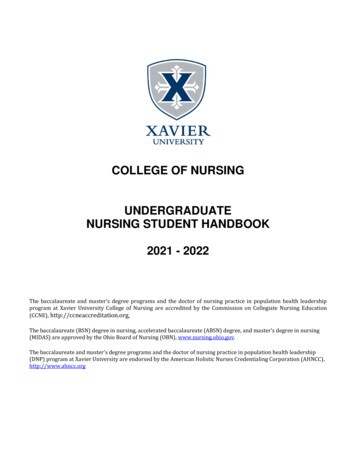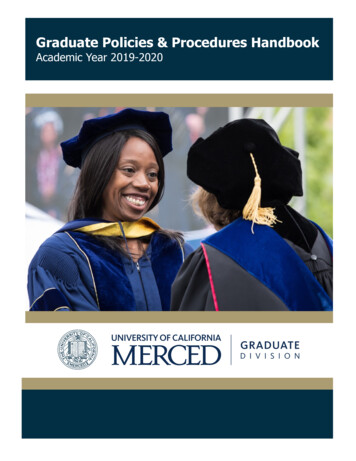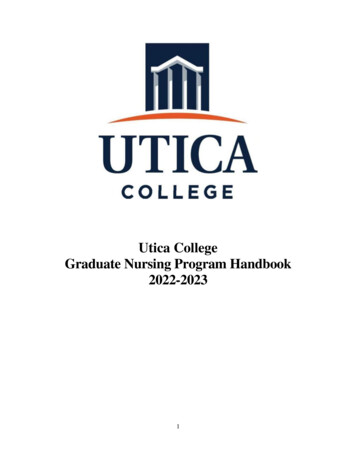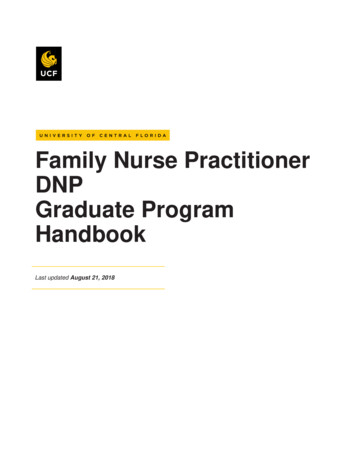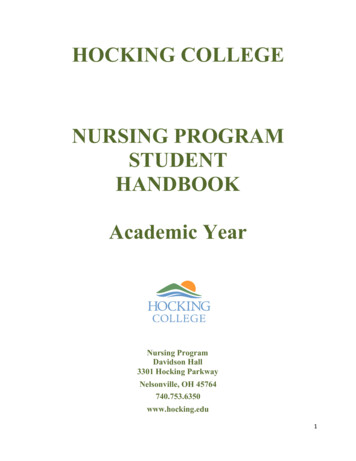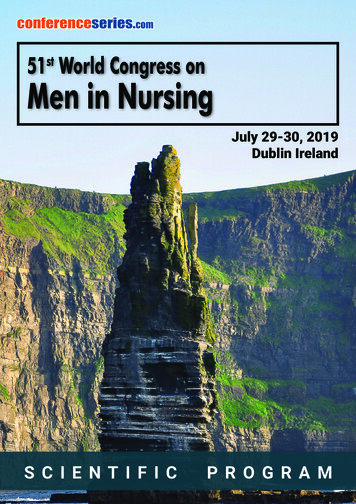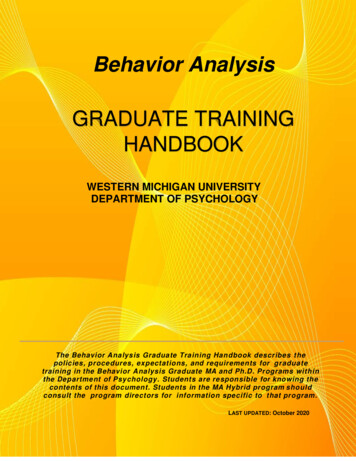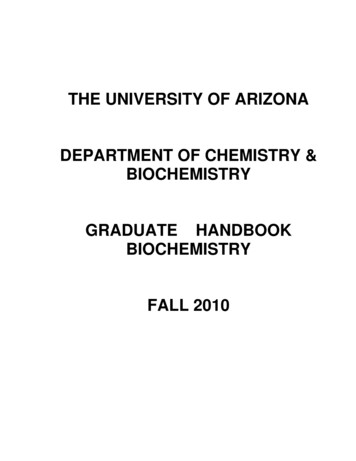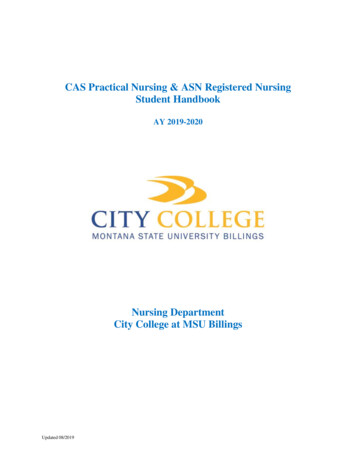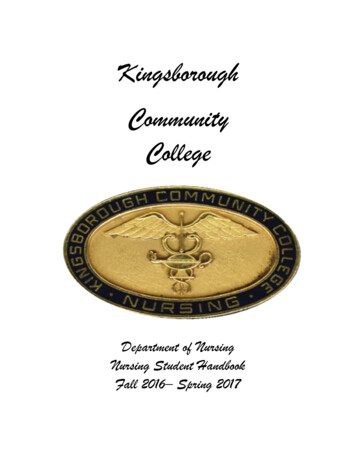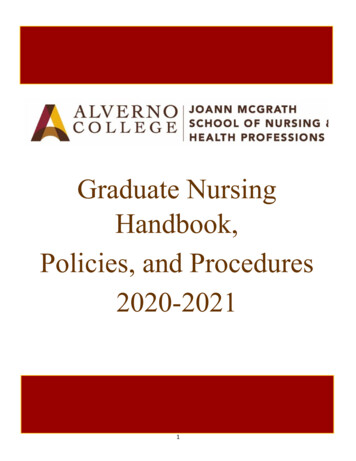
Transcription
Graduate NursingHandbook,Policies, and Procedures2020-20211
STUDENT ATTESTATION:GRADUATE NURSING STUDENT HANDBOOK,POLICIES, AND PROCEDURESCOURSE NAME: MSN 600, MSN 600A, MSN 600B (CIRCLE/HIGHLIGHT ONE)By signing this statement, I acknowledge that I have accessed the Graduated Nursing Student Handbook, Policies, andProcedures electronically from the Alverno website and read it in its entirety. I understand that the content of theHandbook is subject to change without notice and as a graduate nursing student of Alverno College, I am responsible forkeeping up-to-date on all information, policies, and procedures therein,PRINT YOUR NAMESIGNATUREDATE2
Table of ContentsStudent Attestation: Graduate Nursing Student Handbook, Policies, and Procedures .2I. ALVERNO COLLEGE MISSION .5II. OVERVIEW OF JOANN MCGRATH SCHOOL OF NURSING & HEALTH PROFESSIONSMission , .5Vision 5Philosophy of Education . .5Purposes of Graduate Nursing Program . .5III. OVERVIEW OF ADVANCED PRACTICE PROGRAMS MASTER OF SCIENCE IN NURSING (MSN)DEGREE AND POST-MASTER’S CERTIFICATE PROGRAMSFoundations of Advanced Practice MSN degree and Post-Master’s Certificate Curriculum . 6Outcomes of Advanced Practice MSN Degree and Post-Master’s Certificate Curriculum . .7Advanced Practice MSN Degree and Post-Master’s Certificate Programs Admission Requirements . Summary of Graduate Advanced Practice Nursing Programs Curriculum .77Adult-Gerontology Clinical Nurse Specialist (AG-CNS) Curriculum .14AG-CNS Track Course Descriptions .14Adult-Gerontology Acute Care Nurse Practitioner (AGACNP) Curriculum .AGACNP Track Course Descriptions .1616Adult-Gerontology Primary Care Nurse Practitioner (AGPCNP) Curriculum 18AGPCNP Track Course Descriptions .19Dual Adult-Gerontology Primary Care Nurse Practitioner & Acute Care Nurse Practitioner (AGPCNP/AGACNP) Curriculum20Dual AGPCNP/AGACNP Track Course Descriptions 20Family Nurse Practitioner (FNP) Curriculum .23FNP Track Course Descriptions .Neonatal Nurse Practitioner (NNP) Curriculum .2324NNP Track Course Descriptions .25Psychiatric-Mental Health Nurse Practitioner (PMHNP) Curriculum 27PMHNP Track Course Descriptions 27IV. OVERVIEW OF DIRECT ENTRY MASTER OF SCIENCE IN NURSING (DEMSN) PROGRAMFoundations of DEMSN Curriculum 29Outcomes of the DEMSN Curriculum .29DEMSN Program Admission Requirements Summary of DEMSN Program Curriculum . 3030Recommended DEMSN Course Sequence by Semester Enrollment . .31DEMSN Course Descriptions . 32DEMSN Program-Specific Policies and Procedures 3738V. OVERVIEW OF DOCTOR OF NURSING (DNP) PROGRAM . .VI. GRADUATE NURSING POLICIES AND PROCEDURESAcademic Misconduct . 39Access for Students with Disabilities . .413
Cardiopulmonary Resuscitation Certifications .41Caregiver Background Checks . . .Clinical Event/Error/Near Miss Reporting .4242Center for Clinical Education (CCE) 44Change of Major .45Confidentiality .45Copyright and Fair Use . .45Dropping Courses 46Drug Screening 46Employment (RN) Requirement . .47Health Requirements 47Identification Cards .49Off-Campus Courses 49Practica: Advanced Practice Programs Practicum Experience Practica: DEMSN Program Clinical Practicum Experience 5053Practica: Doctor of Nursing Practice (DNP) Program Practicum Experience .55Professionalism 55Professional Liability Insurance . Progression in Graduate Nursing Programs . 5556Responsibility for Contents of the Graduate Nursing Handbook, Policies, and Procedures 58Student Advising .58Student Conflict Resolution .Student Responsibilities .5960Textbook Orders .61Use of Alverno College Technology 61VII. GENERAL INFORMATIONJoAnn McGrath School of Nursing & Health Professions Committee Structure 62Right to Modify Course Syllabi and Maps, and Graduate Nursing Handbook, Policies, and Procedures .62VIII. APPENDICIESAppendix A: Criteria for Effective Writing .64Appendix B: Criteria for Effective Speaking 66Appendix C: Criteria for Effective Social Interaction . 69Appendix D: Health Insurance Coverage Form .70Appendix E: Advanced Practice MSN Degree and Post-Master’s Certificate Program Student Preceptor Request Form 71Appendix F: Advanced Practice Programs Practicum Goals Form 72Appendix G: Professionalism Rubric .73Appendix H: Permission Form: Nursing Program of Studies .754
I. ALVERNO COLLEGE MISSIONAlverno College prepares women for lives of personal and professional distinction and meaningful engagement with theworld. Alverno extends this mission by offering graduate and adult programs to women and men. Inspired by its Catholic,Franciscan, and liberal arts heritage, the College intentionally creates and inclusive community that engages students inactive and collaborative learning and fosters academic excellence.II. OVERVIEW OF JOANN MCGRATH SCHOOL OF NURSING ANDHEALTH PROFESSIONSMissionThe mission of the JoAnn McGrath School of Nursing & Health Professions at Alverno College is to prepare proficient,devoted professionals who are grounded in science to promote the well-being of diverse populations in globalcommunities. Our essential focus is to design student learning opportunities to guide the education of unique individuals,highlighting personal and professional development of practitioners who are prepared for leadership and life-longlearning.VisionThe vision of the JoAnn McGrath School of Nursing & Health Professions is to develop professionals with globalinfluence through innovative education.Philosophy of EducationThe Alverno College JoAnn McGrath School of Nursing & Health Professions believes the focus of our work is thelearner’s personal and professional development. We prepare a nursing professional who is compassionate, ethical,proactive, proficient, and dedicated to lifelong learning in our diverse and ever-changing global communities.An ability-based curriculum underlies the art and science of nursing education. Founded on the liberal arts, the curriculumintegrates human connection, science, and technology to promote health and intervene holistically to human responses.Through innovative learning experiences, we assist the learner to cultivate, apply, and transfer comprehensive knowledge,skills, and abilities that lead to reflective nursing practice.Alverno faculty and staff believe education goes beyond knowing to being able to do what one knows. Sensitive to uniquelearning needs, nursing faculty commit to performance-based, multidisciplinary educational practice including publiccriteria, feedback, and self-assessment. Developmental and varied experiences contribute to learning and increasingprofessional competence.The teaching/learning process is a collaborative partnership among learners, educators, health care systems, and thebroader community. Educators and learners are mutually responsible to take ownership of and actively engage in learningexperiences. Curricula continually evolve to incorporate current theory, research, science, standards, and evidence-basedpractices. As accomplished educators, learners, researchers, practitioners, and socialized professionals, Alverno facultyserve as role models of lifelong learning. Our goal is to promote a process of teaching and learning that provides guidanceto students in the development of career goals and advancement of nursing practice.Purposes of Graduate Nursing ProgramThe purposes of the Graduate Nursing Program are to provide advanced programs of study in nursing and opportunitiesfor personal development that enable graduates to maximize their scope of practice to positively impact the health ofindividuals, families, and communities; improve healthcare quality and accessibility, especially to vulnerable populations;and advance the nursing profession. In doing so, graduate nursing faculty provide direction for the JoAnn McGrath Schoolof Nursing & Health Professions consistent with the purposes of Alverno College: namely creating a community oflearning, creating a curriculum, creating ties to the community, and creating relationships with higher education.5
III. OVERVIEW OF ADVANCED PRACTICEMASTER OF SCIENCE IN NURSING (MSN) DEGREE ANDPOST-MASTER’S CERTIFICATE PROGRAMSThe advanced practice graduate nursing programs, available to women and men, carry on Alverno College’s tradition in theprofessional liberal arts, with particular focus on integrative, experiential, and reflective approaches to learning. Theadvanced practice MSN degree and post-master’s certificate curriculum supports students’ development of advancedknowledge and advanced competence in the abilities that frame the undergraduate curriculum at Alverno College:Communication, Analysis, Problem Solving, Valuing in Decision Making, Social Interaction, Developing a GlobalPerspective, Effective Citizenship, and Aesthetic Engagement. Practicum experiences and didactic courses are designed tosupport the learner in applying selected abilities with individuals, families, and groups across the developmental lifespanand in diverse health care settings.Alverno College offers the following advanced practice MSN degree programs: Adult-Gerontology Clinical Nurse Specialist Adult-Gerontology Acute Care Nurse Practitioner Adult-Gerontology Primary Care Nurse Practitioner Dual Adult-Gerontology Primary Care and Acute Care Nurse Practitioner Family Nurse Practitioner Neonatal Nurse Practitioner Psychiatric Mental Health Nurse PractitionerThe following advanced practice post-master’s certificate programs are offered: Adult-Gerontology Clinical Nurse Specialist Adult-Gerontology Acute Care Nurse Practitioner Adult-Gerontology Primary Care Nurse Practitioner Family Nurse Practitioner Neonatal Nurse Practitioner Psychiatric Mental Health Nurse PractitionerFoundations of Advanced Practice MSN Degree andPost-Master’s Certificate CurriculumThree American Nurses Association (ANA) documents espouse the basis for all nursing practice, and Alverno nursingfaculty use these documents to underpin the curriculum and structure its content and learning experiences: Nursing: Scope and Standards of Practice (3rd ed.; ANA, 2015) Guide to the Code of Ethics for Nurses with Interpretive Statements: Development, Interpretation, andApplication (2nd ed.; ANA, 2015) Guide to Nursing’s Social Policy Statement: Understanding the Profession from Social Contract to SocialCovenant (ANA, 2015)In addition, the following documents espouse standards, competencies, and criteria that specifically serve to ground theMSN curriculum:6
Standards for Accreditation of Baccalaureate and Graduate Nursing Programs (Commission on CollegiateNursing Education [CCNE], 2018) The Essentials of Master’s Education in Nursing (American Association of Colleges of Nursing [AACN],2011)The following standards have been incorporated into the curriculum of the advanced practice MSN degree and post-master’scertificate nurse practitioner programs: Standards of Practice for Nurse Practitioners (American Association of Nurse Practitioners [AANP], 2019) Nurse Practitioner Core Competencies Content (National Organization of Nurse Practitioner Faculties[NONPF], 2017) Criteria for Evaluation of Nurse Practitioner Programs (National Task Force on Quality Nurse PractitionerEducation [NTF], 2016) Crosswalk Table: Comparing the CCNE’s Standards for Accreditation of Baccalaureate and Graduate NursingPrograms (2018) and the National Task Force on Quality Nurse Practitioner Education (NTF) Criteria forEducation of Nurse Practitioner Programs (2016) (CCNE, 2018).The following standards have been incorporated into the Adult-Gerontology Clinical Nurse Specialist program curriculum: Statement on Clinical Nurse Specialist Practice and Education (3rd ed.; National Association of Clinical NurseSpecialists [NACNS], 2019) Adult-Gerontology Clinical Nurse Specialist Competencies (AACN, 2010) Gerontology Nursing: Scope and Standards of Practice (3rd ed.; ANA, 2012)The following population-focused competencies and standards have been incorporated into the nurse practitioner programs, asappropriate: Adult-Gerontology Acute Care and Primary Care Nurse Practitioner Competencies (AACN & NONPF, 2016). Education Standards and Curriculum Guidelines for Neonatal Nurse Practitioner Programs, (NationalAssociation of Neonatal Nurse Practitioners [NANNP], 2017). Neonatal Nurse Practitioner Competencies and Orientation Toolkit for Neonatal Nurse Practitioners (2nd ed.;NANNP, 2014) Population-Focused Nurse Practitioner Competencies: Family/Across the Lifespan, Neonatal, Acute CarePediatric, Primary Care Pediatric, Psychiatric-Mental Health, & Women’s Health/Gender-Related (NONPF,2013)Outcomes of Advanced Practice MSN Degree andPost-Master’s Certificate CurriculumIn the role of the Advanced Practice Registered Nurse (APRN), the MSN program graduate and post-master's certificateprogram graduate will: Exhibit mastery of communication skills in multiple modes to build crucial inter-professional team relationshipsthat promote collaboration to ensure safe and effective outcomes. Provide holistic, patient-focused, evidence-based care. Evaluate and apply informatics using current and evolving technology to facilitate and enhance optimal clinicalcare and organizational decision-making. Skillfully engage in collaborative and trans-disciplinary leadership to (re)construct strategies for innovative andtransformative change in complex healthcare settings.7
Synthesize current and emerging science and theory to design ethical and cost-effective approaches to care thatconsider the uniqueness of individuals, families, communities and populations.Advanced Practice MSN Degree and Post-Master’s Certificate ProgramsAdmission RequirementsAdvanced Practice MSN Degree Program Applicants: BSN degree conferred by a college or university accredited by a nursing accreditation agency approved by theU.S. Department of Education Unencumbered WI registered nurse (RN) license or multi-state compact licensure RN employment (full or part-time) (See Section VI: RN Employment Requirement Policy) Completion of an approved undergraduate or graduate-level inferential statistics course with a grade of “B” orbetter within 5 years of admission. Alternatively, the student may take an approved inferential statistics courseduring the first semester of study. BSC 257 and MSN 650 (preferred) are two Alverno course options that satisfythis requirement.Advanced Practice Post-Master’s Certificate Program Applicants: MSN degree conferred by a college or university accredited by a nursing accreditation agency approved by theU.S. Department of Education Unencumbered WI registered nurse (RN) license or multi-state compact licensure RN employment (full or part-time) (See Section VI: RN Employment Requirement Policy)Non-U.S. Applicants: minimum TOEFL score of 550Adult-Gerontology Acute Care Nurse Practitioner Program and Dual Adult-Gerontology Primary Care and AcuteCare Nurse Practitioner Program Applicants Only: Minimum of one year of full-time acute care nursing work experience (or its part-time equivalent) within fiveyears of admission Minimum of one year full-time acute care specialty or critical care nursing work experience (or its part-timeequivalent) within five years prior to entering track courses Current ACLS certification preferred on admission, and required prior to and throughout clinical practicumcoursesNeonatal Nurse Practitioner Program Applicants Only: Minimum of two years of full-time (or equivalent) clinical practice experience as an RN in the care of critically illneonates or infants prior to and within five years of entering the NNP track courses. The majority of this practiceexperience must be obtained in a Level III and/or IV NICU. Current employment (full or part-time) in a Level III and/or Level IV NICU is a requirement for admission to andcontinued progression in the Neonatal Nurse Practitioner Program NRP certification required prior to clinical and throughout clinical practicum courses.Summary of Graduate Advanced Practice Nursing Programs CurriculumAll graduate students enrolled in an advanced practice MSN degree program must take the graduate nursing advancedpractice program core courses and the set of courses specific to their program track. With the exception of the Capstonecourses (i.e., MSN 755 and MSN 760), all core courses must be completed prior to enrollment in the track courses.Advanced practice MSN degree seeking students enroll in MSN 600 Orientation concurrent with their first semester;advanced practice post-master’s program students enroll in MSN 600a Orientation concurrent with their first track course.8
MSN 600 and MSN 600a are delivered online and must be completed by the student within two weeks (14 days) of thesemester start date of graduate weekend college (WEC) as identified in the Alverno College Academic Calendarpublished on the College website.Graduate students must take 3 semester credits (part-time status) to be eligible for financial aid; students must take 6semester credits to be considered full-time. Further information about the curriculum is provided in the current AlvernoCollege Bulletin.Graduate Nursing Advanced Practice Program Core Courses:MSN 600: Orientation (MSN degree program students only, 0 credits)MSN 600a: Orientation (post-master’s certificate program students only, 0 credits)MSN 615: Advanced Practice Roles and Nursing Theories (3 credits)MSN 621: Advanced Physiology and Pathophysiology (3 credits)MSN 602: Nursing Inquiry, Research, and Scholarship (3 credits)MSN 616: Ethics for the Advanced Practice Nurse (1 credit)MSN 622: Advanced Health and Physical Assessment (3 credits)MSN 603: Health Care Systems: Organization, Economics, and Politics (3 credits)MSN 617: Population-Based Health (3 credits)MSN 623: Advanced Pharmacotherapeutics and Clinical Decision Making (3 credits)MSN 755: Capstone 1 (1 credit)MSN 760: Capstone 2 (1 credit)Graduate Nursing Advanced Practice Program Core Course DescriptionsMSN 600: Orientation to MSN Program (0 credits)Prerequisite: Admission to the advanced practice MSN degree program.Students engage in on-line activities to become oriented to Alverno College and the Graduate Nursing Program. CastleBranch requirements are completed.MSN 600a: Orientation to Post-Master’s Certificate Program (0 credits)Prerequisite: Admission to the post-master’s certificate program.Students engage in on-line activities to become oriented to Alverno College and the Graduate Nursing Program. CastleBranch requirements are completed.MSN 602 Nursing Inquiry, Research and Scholarship (3 credits)Prerequisite: MSN 615 completed or concurrent, or equivalent course pre-approved for transfer credit. Completion ofundergraduate inferential statistics course within 5 years of admission to the advanced practice MSN programStudents develop research skills to facilitate utilization of knowledge that promotes high quality health care to clients,initiates change, and improves nursing education and advanced practice. These skills include the ability to: criticallyevaluate the appropriateness and usefulness of research; identify problems in practice settings through data review anddevelop strategies to address them through either application of research findings or quality improvement processes;evaluate the quality of practice guidelines; and relate study findings to practice outcomes. Ethical principles and practicesin the conduct of nursing research with human subjects are explored.MSN 603 Health Care Systems: Organization, Economics, and Politics (3 credits)Prerequisite: MSN 615 completed or concurrent, or equivalent course pre-approved for transfer credit.9
Students comprehensively and systematically examine the interrelationships among health care policy and politics, deliveryand access to care issues, and financing of health care in order to make high quality, cost-effective choices in the allocationof health care resources and to participate in formulating health care agendas for individuals and communities. Studentsbecome intimately knowledgeable of federal, state, and local health care resources. They analyze the interaction and theimpact of politics, organization, and economics on their areas of practice.MSN 615 Advanced Practice Roles and Nursing Theories (3 credits)Prerequisite: MSN 600 or MSN 600a completed or concurrent.Students explore current and emerging roles of advanced practice nurses (APRNs) in various settings, including requiredcompetencies, scope of practice, and issues of specialization. They examine the roles of the APRN within aninterdisciplinary health care system, with an emphasis on legal and professional issues, models of practice, and leadership.Students also examine the evolving theoretical foundations of the nursing profession through the exploration of nursing andrelated disciplines’ theories. They learn to analyze, critique, and evaluate various theories to determine their utility to guideAPRN practice and education in select populations. Advanced practice nurses use multiple theories in their work withindividuals, families, communities and organizations. This course provides students with a solid grounding in theoreticalanalysis and application within their specific roles. Note: MSN 615 is not required for post-master’s certificate studentswith current national board certification practicing in the APRN role.MSN 616 Ethics for the Advanced Practice Nurse (1 credit)Prerequisite: MSN 600 completed or concurrent.Students start with an examination of their own moral decision-making and are then introduced to ethical models andframeworks will be introduced. Ethical decision-making processes are discussed as they relate to the role of the advancedpractice nurse and are applied to practice situations including informed consent and end-of-life issues. The role of ethicscommittees and consultations is also explored.MSN 617 Population-Based Health (3 credits)Prerequisite: MSN 615 completed or concurrent, or equivalent course pre-approved for transfer credit.This course introduces students to health promotion fundamentals in advanced practice nursing. Basic epidemiologicalprinciples and international, national and local health promotion goals are examined with emphasis on cultural competence andenvironmental principles, individual assessment, and evidence-based practice. Students are introduced to concepts of interprofessionalism and patient-centered care while exploring the leadership role of the APRN. Students analyze and describehealth information technologies and data sources that promote safe practice environments, patient safety, cost-effectiveness,and optimal population health outcomes.MSN 621 Advanced Physiology and Pathophysiology (3 credits)Prerequisite: MSN 600 or MSN 600a completed or concurrent.Students use theory and research to explore the etiology, pathogenesis, and clinical manifestations of common diseases forindividuals across the lifespan, including adult and older-adult populations. They also study variations in physiologicalhealth and illness processes attributable to age, race, culture, ethnicity, gender, and socioeconomic status. The focus is ongeneralized stress response and how the body adapts to a variety of acute and chronic illnesses throughout the span of one’slife. This course is the supporting foundation for advanced-practice clinical decision making, diagnosing, and managing atherapeutic approach across the lifespan. Prior knowledge of basic physiology and pathophysiology is required.MSN 622 Advanced Health and Physical Assessment (3 credits)Prerequisite: MSN 621 completed or equivalent course pre-approved for transfer credit. Current CPR certification andupdated immunization records required.Students examine and apply advanced health and physical assessment techniques and theories in the collaborative care ofculturally diverse individuals and families with an emphasis on individuals across the lifespan, including adult and older-adultpopulations. They develop advanced physical assessment skills and use data and clinical decision making within thedefined context of their professional practice. They use differential diagnoses to identify physical and/or psychological10
illness based on possible pathology, given the lifestyle practices of clients. Prior knowledge and experience of basic healthand physical assessment techniques are required.MSN 623 Advanced Pharmacotherapeutics and Clinical Decision Making (3 credits)Prerequisite: MSN 621 completed or equivalent course pre-approved for transfer credit. Current CPR certification andupdated immunization records required.Students examine and apply principles of advanced pharmacology in the management of clients across the lifespan with anemphasis on the adult-gerontology population. The course emphasizes pharmacokinetics and pharmacotherapeutics ofmajor drug classifications, and current clinical drug research. Students evaluate ethnopharmacological research studies todiscern clinical applications with individuals from racially and ethnically diverse backgrounds. This course also helpsprepare students for national certification and for meeting state requirements for prescriptive authority as an APRN aftergraduation from the MSN program.MSN 755 Capstone 1 (1 credit)Prerequisites: All advanced practice program core courses completed; first track theory course (MSN 700, MSN 624,MSN 634, MSN 644, MSN 654, MSN 684, or MSN 694) concurrent or completed.The capstone is a project that synthesizes student’s learning from all previous semesters in a final demonstration ofmeeting program outcomes for graduation. Each student works throughout the semester to develop a proposal for theplanned capstone project. The proposal includes a solid case for the need for the identified project, a clear purposestatement, and a review of literature. The methods for implementing the project is also outlined. The student works closelywith a chosen faculty capstone mentor throughout this process.MSN 760 Capstone 2 (1 credit)Prerequisite: MSN 755 completed.In this course, students implement the project identified in their capstone proposal. They will then analyze the result of theproject and identify areas for improvement and further exploration. The final product must be approved by their chosenfaculty capstone mentors as meeting program outcomes for graduation.Capstone ProjectAll advanced practice MSN degree program students are required to complete a capstone project; advanced practice postmaster’s certificate programs do not have this requirement. The Capstone is a summative scholarly project conceptualizedand executed in MSN 755 and MSN 760. Typically, students enroll in these courses and conduct the project during thetwo final semesters of their program. Alternatively, some students conduct the project after completing their track courses.The Capstone serves as the final graduation requirement for advanced practice MSN degree program students. Completedunder the guidance of a faculty mentor, the capstone project reflects high standards of scholarly inquiry, technical mastery,and literary skill commensurate with graduate education. The overriding goal of the Capstone is for the student todemonstrate knowledge and proficiency in a specific area of interest. Through the project, students integrate and apply theknowledge and skills they acquired through the academic coursework of their program to a particular problem within thescope of their future advanced practice. The problem of interest and the importance of addressing it is established throughthe literature, thereby justifying the need for the project. The Capstone is grounded in theoretical frameworks and researchevidence located in peer-reviewed journals, culminating in scholarly paper and professional poster presentation.The student assumes full responsibility for understanding and fulfilling the most current requirements of the project,which are described in the Ca
and advance the nursing profession. In doing so, graduate nursing faculty provide direction for the JoAnn McGrath School of Nursing & Health Professions consistent with the purposes of Alverno College: namely creating a community of learning, creating a curriculum, creating ties to the community, and creating relationships with higher education.
